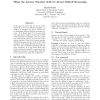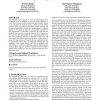1734 search results - page 21 / 347 » What works |
KR
1989
Springer
13 years 12 months ago
1989
Springer
In this paper I argue that we do not understand the process of default reasoning. A number of examples are given which serve to distinguish di erent default reasoning systems. It ...
ITICSE
2010
ACM
13 years 9 months ago
2010
ACM
We show how to teach and motivate small quantum computer programs as a supplemental topic in a CS2 data structures class. A traditional example such as Shor’s factorization [8] ...
ECTEL
2008
Springer
13 years 9 months ago
2008
Springer
In an empirical study, we provided (or not) pairs of students working in a remote collaborative learning situation with a knowledge awareness tool that provided learner A with lear...
ESEM
2008
ACM
13 years 9 months ago
2008
ACM
Pair programming is a practice in which two programmers work collaboratively at one computer on the same design, algorithm, or code. Prior research on pair programming has primari...
EMNLP
2007
13 years 9 months ago
2007
This paper presents a syntax-driven approach to question answering, specifically the answer-sentence selection problem for short-answer questions. Rather than using syntactic fea...


